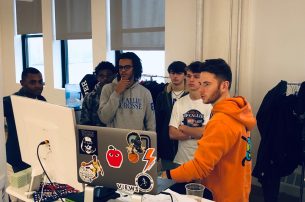Research and Insights: Laugh till I Seek: A Reassessment of the Gateway Hypothesis
Recent research from Public Relations Assistant Professor Jay Hmielowski. This summary is also available in Research and Insights.
Research has shown that political satire could play an important role in informing people about political issues. Moreover, these increases in knowledge could then result in people increasing their use of hard news content. This idea of satire increasing news use has been called the Gateway Hypothesis.
This theory is grounded in the idea that, due to its entertaining nature, satire programs sugarcoat the bitter pill of political information. In essence, the entertaining nature of satire makes the seemingly dry information presented on typical newscasts fun an entertaining. Because this content is seen as fun, less engaged citizens end up learning about important political information via these entertainment centric shows.
Previous studies, by and large, have found use of political satire programs is associated with use of hard news content. New research by University of Florida College of Journalism and Communications Public Relations Assistant Professor Jay Hmielowski and Michaele Myers at the University of Minnesota, takes a more rigorous look at examining the Gateway Hypothesis through the use of multi-wave, over time survey data.
Results from the study first showed that use of satire was associated with use of various news outlets (i.e., use of CNN, MSNBC, FOX News). However, these results failed to replicate when examining whether use of satire at one point in time actually led to increases in hard news use at a later date. In essence, the results showed that use of programs such as the Late Show with Stephen Colbert in September did not lead to increases in people’s use of hard news in October. However, their study did find that use of satire changed people’s evaluations of presidential candidates, which then translated into increased use of hard news. That is, using satire increased people’s positive feelings toward Hillary Clinton, which then led people to use outlets such as CNN.
These results show that use of entertainment centric programing could eventually lead people to consume hard news content. However, the entertainment-based programing, in this case political satire, may need to affect people’s political attitudes and beliefs to change their hard news use habits.
The original research paper, “Laugh till I Seek: A Reassessment of the Gateway Hypothesis,” was presented at the AEJMC conference in August, 2019.
Authors: Michaele Myers, University of Minnesota; Jay Hmielowski, University of Florida.
Posted: November 5, 2019
Category: Digest Only

